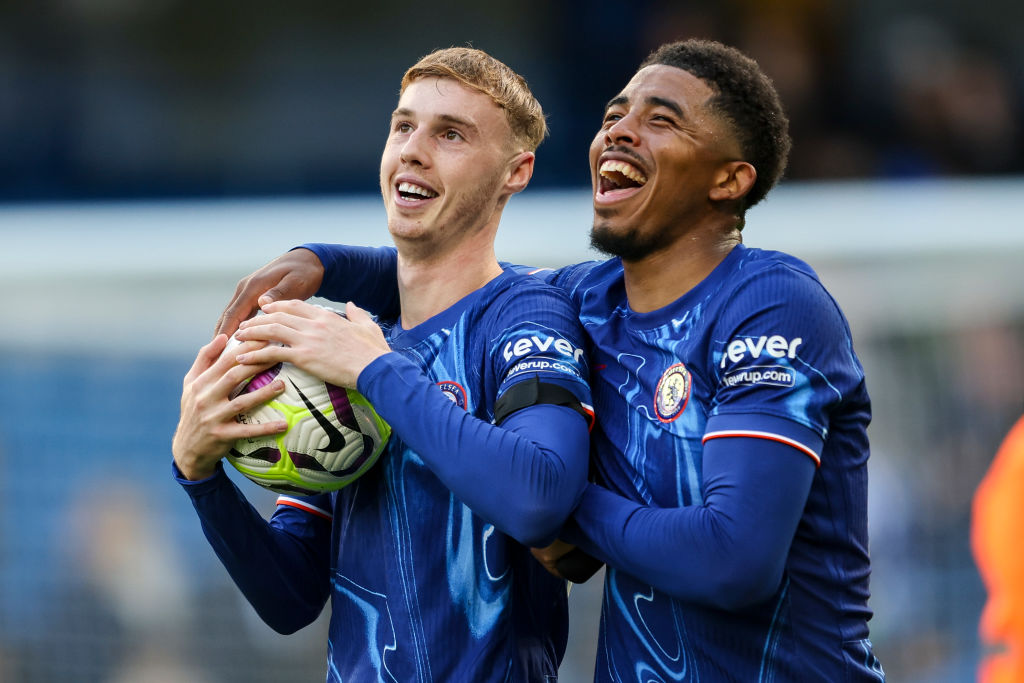FourFourTwo's 100 best foreign Premier League players ever: 20-11
Into the top 20 we go – and now we're getting iconic. But who's just missed out on our top 10 imported aces?
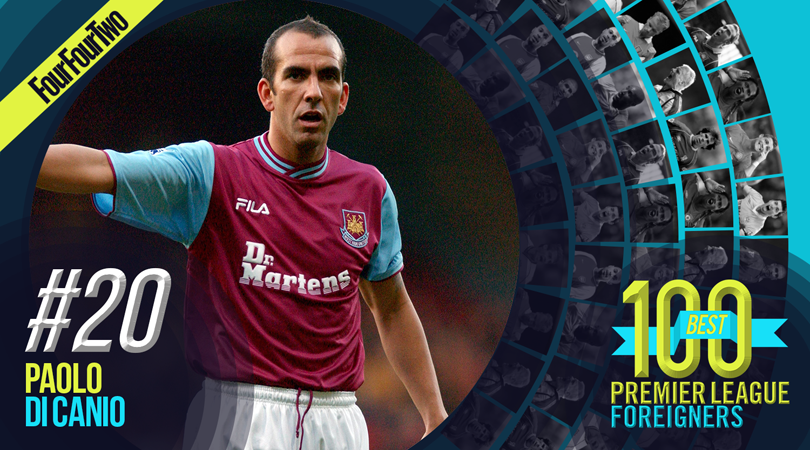
Words: Alex Hess, Jon Spurling, Andrew Murray, Richard Edwards, Seb Stafford-Bloor
20. Paolo Di Canio
If you’re able to separate the artist from his art, then it’s impossible not to appreciate the sheer magnificence of Di Canio in his pomp. The Italian held some suspect political views, but he also possessed one of the great right boots of the modern era, immortalised with the kung-fu volley he sent searing past Neil Sullivan in March 2000.
Di Canio had stints at Sheffield Wednesday and Charlton (and can be counted among the few of Alex Ferguson’s ones that got away), but by far his most impressive spell in England came sandwiched between those, with four years at West Ham. During that time he offered all the hallmarks of a cult hero: oodles of technical talent, a wild temperament and a showman’s eye for the spectacular.
Di Canio’s time in the Premier League was a compilation-video treasure trove – to go with his various wondergoals, he shoved a referee to the floor and, in an act of bizarre sportsmanship, caught a cross with his hands as an open goal lay in waiting (and the opposition keeper lay injured) – but he was a deadly serious sportsman, too, a finely tuned fitness and nutrition freak at a time when top-flight careers were open to timber merchants like Neil Ruddock. AH
19. Robin van Persie
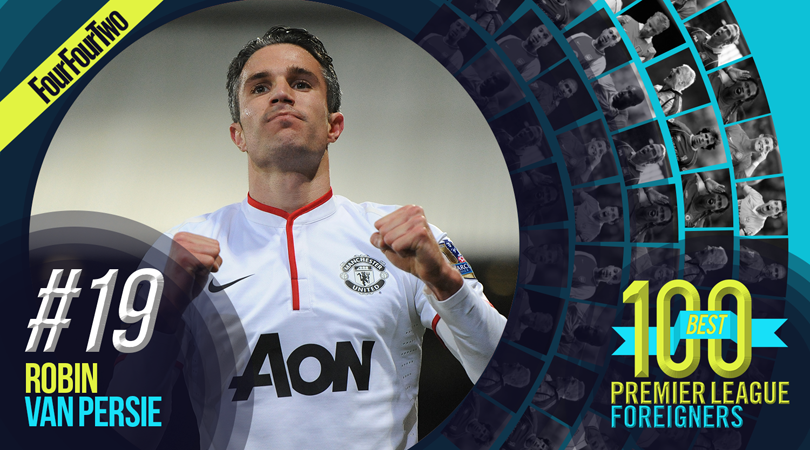
The 21-year-old Feyenoord forward arrived at Highbury in May 2004 for a mere £2.75m, a snip for a club basking in the afterglow of the ‘Invincibles’ season. Van Persie wasn’t an immediate shoo-in and had to fight off competition from another recently imported youngster, Jose Antonio Reyes, yet he was always the more convincing of the two and soon began to demonstrate the potency of his unerringly accurate left foot.
Get FourFourTwo Newsletter
The best features, fun and footballing quizzes, straight to your inbox every week.
The Gunners were in with a genuine chance of lifting the title in both 2008 and 2011; arguably the missing piece of the jigsaw was a fully-fit Van Persie for the entire campaign. Injuries blighted his Arsenal career, until a return to full fitness in March 2011 heralded a glorious 14-month golden spell in which the striker barely stopped scoring as Arsene Wenger's side once again secured Champions League football.
But Van Persie wanted more. In August 2012, after netting 132 Arsenal goals, the Dutchman joined rivals Manchester United in search of the Premier League winner’s medal he craved. He was a revelation throughout Sir Alex Ferguson’s final season at Old Trafford, winning the 2013 Golden Boot and the league title after grabbing 26 goals – including an exquisite volley against Aston Villa – in 38 games. His move to Old Trafford, however unpopular with Arsenal fans, had been fully vindicated. JS
18. Yaya Toure
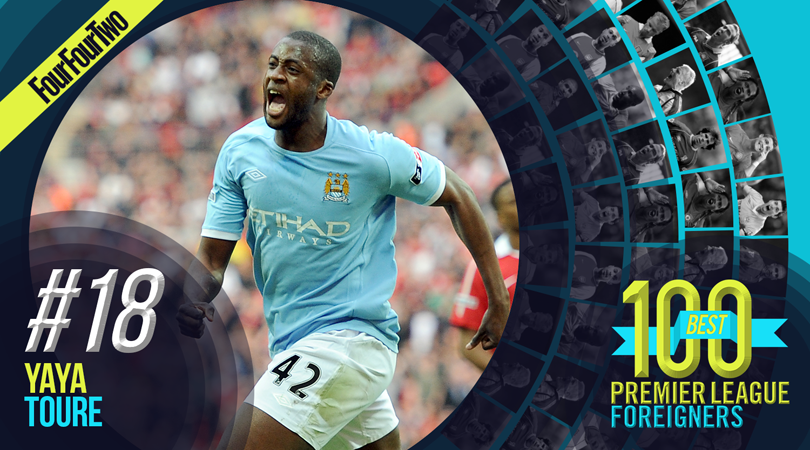
Part-human juggernaut, part-parable teller (ask anyone who’s ever interviewed him, this correspondent included), Toure made sure that Twitter birthdays would never be the same again. In fairness to the hulking Ivorian, neither would Manchester City’s recent history.
Something of a football nomad before arriving at the Etihad for £24m in 2010 – he’d played in Belgium, Ukraine, Greece, France and Spain – Toure settled quickly in Manchester. He evolved, too, from a defensive midfielder into something altogether more all-action, with added goal threat. Sixty Premier League goals – and counting – is an impressive haul for a midfielder who's played one-third of his games as an anchor.
His displays in winning the 2013/14 title – ahead of a Luis Suarez-inspired Liverpool – warrant special mention. Before that season, Toure hadn’t managed more than eight league goals in a single campaign. That term, the talismanic Ivorian scored 20.
It is, of course, very easy to dislike Toure. His agent Dimitri Seluk doesn’t help matters when talking, often with all the self-awareness of Donald Trump, about how mistreated his client is by the world – but Toure’s will to win is conspicuous by its absence when he’s not at the heart of City’s midfield.
Since buckling down to a new fitness regime – that dominant physique is starting to creak – he’s even convinced Pep Guardiola to bring him in from the cold. And nobody gets Guardiola to do something he doesn’t want to do. Anyone got a Turin number for Joe Hart? AM
17. Carlos Tevez
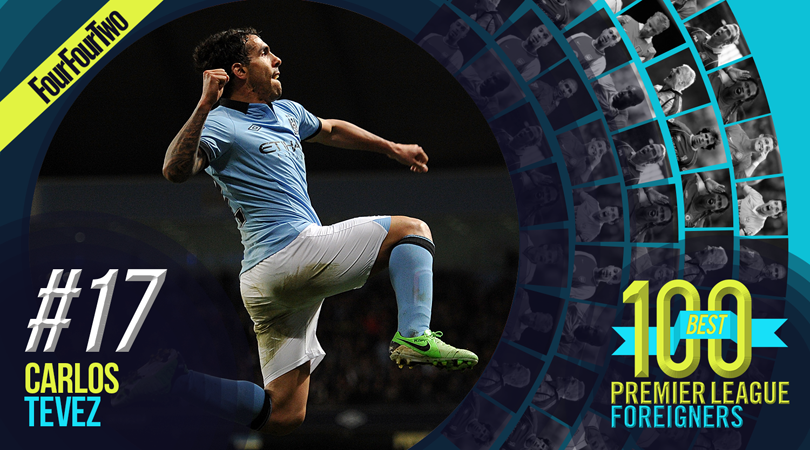
Tevez arrived in bemusement, left in acrimony, and for six years in between proved himself a vital player for three different clubs, winning every trophy there was to win.
“He’s not worth the trouble” was a regular refrain regarding the Argentine, who caused no end of hassle at all his clubs – illegitimacy at West Ham, disloyalty at Manchester United and insurgency at Manchester City. But the refrain wasn’t true: sure, Tevez brought an ungodly amount of trouble, but he was, undeniably, worth it.
His all-action performances at the tail end of the 2006/07 season – not least a final-day winner at Old Trafford – quite literally saved West Ham from relegation, and at United he became an integral part of Ferguson’s last great team; the Ronaldo-fronted, all-conquering side of the late-noughties.
It was at City, though, that he proved both most troublesome and most invaluable: his five-month strike in 2011 was brattish and absurd, yet his very presence at the club, having defected from United, functioned as the proof and embodiment of the new-look City’s ambition to overhaul their neighbours at the top of the food chain. And when he returned from exile in March to fire City to the most pant-wettingly dramatic title win of the Premier League era, he helped enact exactly that.
A dead-eyed mercenary? Undoubtedly. But having fought his way out of the Buenos Aires barrios and been hawked from club to club by dubiously motivated agents, his only loyalty was, quite rightly, to himself. AH
16. Jimmy Floyd Hasselbaink
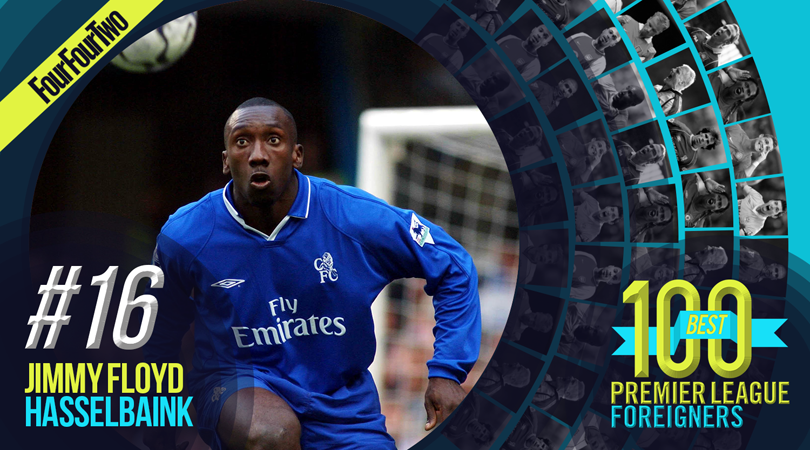
Hasselbaink was a great player undone by bad timing; simple circumstances were all that stood between him and a more decorated career. He left Leeds before they hit their brief peak under David O’Leary, departed Chelsea during the same summer that Jose Mourinho arrived to make the club a force of nature, and arrived at Middlesbrough the season after they won their only trophy of the modern era.
Amid all that was a season at Atletico Madrid, who were relegated despite Hasselbaink ending the season as La Liga’s second-highest scorer, with 24 goals. He ended his career a runner-up in the Premier League, FA Cup (twice) and UEFA Cup, with only one major honour to his name (the 1996/97 Taça de Portugal, in which he was a late substitute.)
It is telling that Hasselbaink makes it so high up this list without having played in a single great side, and few especially good ones. He may have bounced between employers but his eye for goal was nothing if not a constant. As a striker, Hasselbaink was not especially tall, quick or strong; instead his power lay in his technique – specifically, the fiercest ball-striking ability the Premier League has seen.
For all strikers, most efforts on goal represent something of a compromise between power and accuracy. Hasselbaink was able to combine savagery and precision to a mutual maximum, with the added advantage of needing minimal backlift to do so. The result – 129 Premier League goals in 288 games across nine seasons – speaks louder than a medal haul. AH
15. Edwin van der Sar
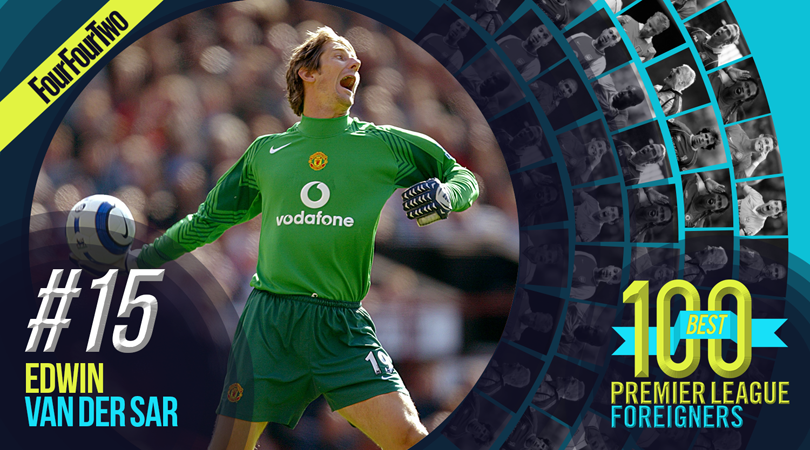
A move to Fulham after two seasons at Juventus didn’t seem like an obvious one, but then Van der Sar always maintained the capacity to surprise. Peeved at the thought of being Gianluigi Buffon’s back-up in Turin, the gangling Dutchman headed to the banks of the Thames for £7.1m in the summer of 2001. Over the next four years, he helped Fulham establish themselves in the top flight and proved himself to be one of the most consistent goalkeepers in the Premier League.
Having been linked with Van der Sar after Peter Schmeichel left Old Trafford in 1999, and undeterred by his advancing years (he was born shortly after The Beatles released their last album), Manchester United snapped him up in 2005 in a £2m deal that would be made to look like the bargain of the century (Ferguson had famously proclaimed Schmeichel to be so in 1991, having landed the Dane for just £505k).
Calm, composed and steely under pressure, Van der Sar won four Premier League titles at the club and helped United to Champions League glory in 2008 against Chelsea in Moscow. Throw in a record 1,311 minutes without conceding a Premier League goal in 2009/10 and it’s easy to see why the Dutchman is as feted here in England as he is in the Netherlands. RE
14. David Silva
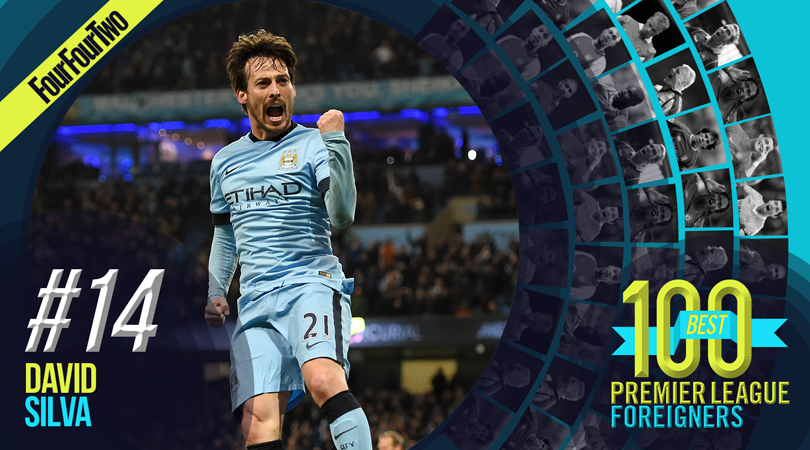
Most Manchester City supporters rate Silva as the finest player to ever represent their club. Not just the finest foreigner, and not just during the Premier League era, either. It's really not difficult to understand why: forget the goals, the assists, and the titles he's associated with, and remember the little moments. To watch him pirouetting away from opponents and escaping out of tight spaces is to see football at its most pure.
There's always been a mildly combative side to his game, too. While not a confrontational player, he exudes more obvious spirit than, say, Mesut Ozil, and the cocktail of his playing style and his mentality is naturally seductive. He can dance, but he can punch too, and so he isn't trailed by the distrust which can sometimes be aimed at other playmakers.
When this mini-era at City is looked back upon in decades to come, attention will likely focus on the more obvious pillars: Sergio Aguero, Vincent Kompany and Yaya Toure. It's fair, too, because collectively those players will be easier to assess for those who never saw them play: they have the goals, they brought the weightier intangibles and their faces are more distinctive on the side of the mountain.
But to contemporary supporters, Silva's features will always be more vivid. He's been the spritely deckhand: jumping and skipping over the ropes and loading the cannons for the better part of a decade. City have their assets because of their wealth, but they've functioned as well as they often have because of David Silva. SSB
13. Petr Cech
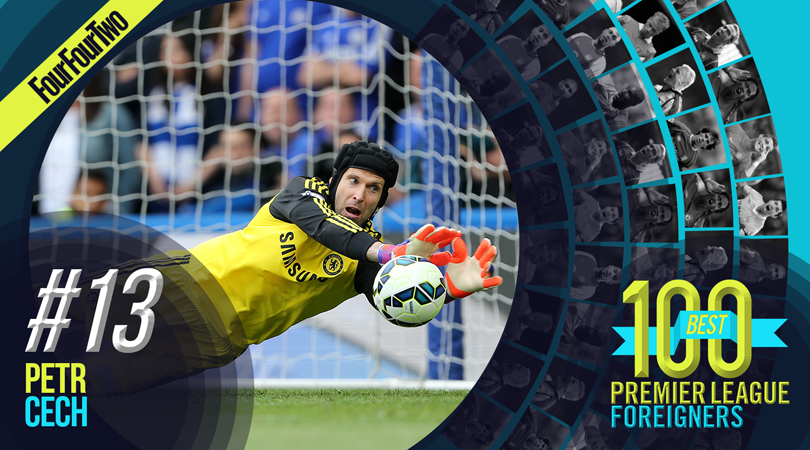
Big-club goalkeeping is a tricky business. Players who stand between the sticks for the country's brightest and best are often scarcely involved and yet subjected to the fiercest scrutiny. Petr Cech has not only had to be a great keeper, but also a person of immense durability.
There's a "before and after" point in his career: in October 2006, the collision with Stephen Hunt resulted in a fractured skull and, one has to imagine, an altered perspective. It's to Cech's great credit, then, that the incident's only legacy is visual – the scrum cap remains to this day, but so too do the high standards that he set before the accident. He returned from injury in 2007 and both at the end of that season and the following year, he won UEFA's Best Goalkeeper award; maybe, given the circumstances, those were higher accolades than the four Premier League trophies he won or the four FA Cups he lifted.
How many times was he definitively pronounced to be in decline? And how often did his subsequent performances belittle those theories? When his Chelsea days were curtailed by the emergence of Thibaut Courtois, he answered the call to solve Arsenal's age-old goalkeeping problem – and in doing so proved just how unusual a player he is. In the years following Jens Lehmann's retirement, many tried to fill the German's gloves, only to be proven emotionally weak, under-talented or error-prone. But across London came Cech, bringing his stable excellence with him and solving an issue which had plagued Arsene Wenger for as long as anyone could remember.
He is an emblem of resiliency, a monument to longevity, but equally he's testament to the breadth of attributes required in an elite goalkeeper. Cech is an excellent shot-stopper blessed with terrific reflexes, but he's also highly reliable in the air and fiercely brave when forwards bear down on him – crucially, his abilities are supported by an iron frame, toughened by self-conviction.
When he retires, people won't necessarily remember his individual games or saves, but rather that his time in England felt like watching one long, uninterrupted performance. SSB
12. Luis Suarez
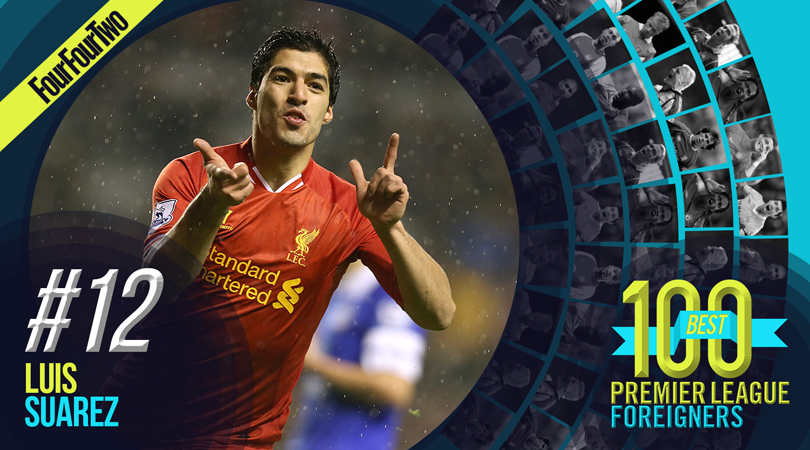
It may seem hard to believe now, after a 2015/16 season which brought 59 goals in just 53 games for Barcelona, but there was a time when the knives were out for Luis Suarez. And not just because of you-know-what.
“Suarez is a fantastic player,” said former Liverpool midfielder Gary McAllister in August 2012, six months into the Uruguayan’s three-and-a-half year Anfield spell, “but I don't know if he is a natural goalscorer, somebody like a Michael Owen.”
Since his £22.8m move from Ajax – briefly a club-record fee, until Andy Carroll barged past it later that day – Suarez had scored just four times in 13 appearances for the Reds. But once he settled, he caught fire, a one-man forward line who could tie entire defences in knots. In his last two seasons at Anfield, he scored 61 times from 81 games in all competitions, single-handedly leading Liverpool agonisingly close to a first top-flight title in 24 years in 2013/14. For that season, because of him, Brendan Rodgers' side were the most thrilling team to watch in world football.

True, he’d tried to force through a transfer to Arsenal the previous summer – for £40,000,001, because of a disputed contract clause – and remains perhaps football’s ultimate Marmite figure, but what is indisputable is the sheer talent and will to win that defines Suarez’s character. Just ask Norwich, against whom the Barcelona striker scored 12 times in six games, including four in a 5-1 rout in December 2013.
Audacious, impudent and utterly unpredictable, Luis Alberto Suarez Diaz is the quintessential South American scuttler. “He’s probably the best player I have played with,” says former Reds captain Steven Gerrard. Well, if he’s good enough for Steven… AM
11. Ruud van Nistelrooy
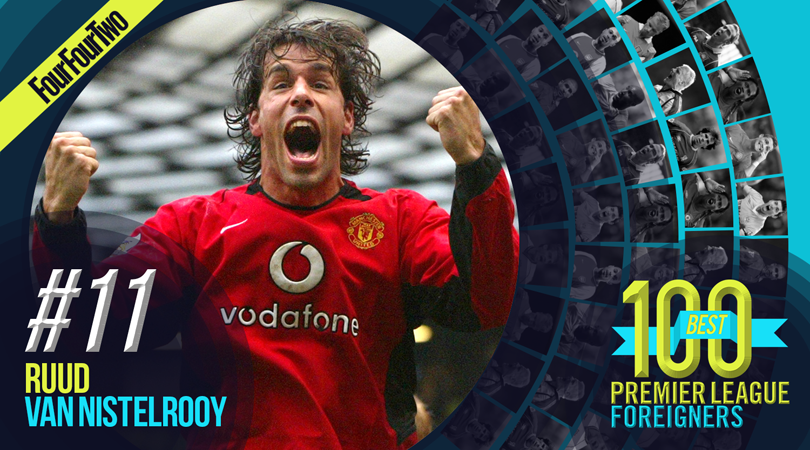
The last great penalty-box striker, Van Nistelrooy would have almost certainly lasted longer at Old Trafford were it not for factors beyond his control (not least a young whippersnapper by the name of Cristiano Ronaldo, crying out for centre stage).
Manchester United waited a full year to sign him from PSV due to a serious knee injury he sustained in 2000, and by the end of his half-decade at Old Trafford the club had been repaid in spades. A mere three medals (Premier League, FA Cup and League Cup) was, all things considered, a rather scant reward for his unrelenting habit of locating net with ball for United, which encompassed a staggering 110 goals across his first three seasons at the club. If goalscoring is an art then Van Nistelrooy was a glorious minimalist, constantly achievement maximum effect via a tightly constrained yet near-flawless skill set.
Van Nistelrooy, who never scored from outside the box for United, was eventually superseded at the club by an army of multi-functional scurriers as Ferguson built his final great side in the late-noughties. This is no blight on the Dutchman, merely evidence of bad luck.
In Japanese cooking, the tradition is to specialise in one thing and do it to absolute perfection. It’s unknown whether or not Van Nistelrooy ever considered a career as a sushi chef, but the chances are he’d have made a pretty good one. AH
100-91 • 90-81 • 80-71 • 70-61 • 60-51 • 50-41 • 40-31 • 30-21 • 20-11 • 10 • 9 • 8 • 7 • 6 • 5 • 4 • 3 • 2 • 1
FourFourTwo's 100 best foreign Premier League players ever
Greg Lea is a freelance football journalist who's filled in wherever FourFourTwo needs him since 2014. He became a Crystal Palace fan after watching a 1-0 loss to Port Vale in 1998, and once got on the scoresheet in a primary school game against Wilfried Zaha's Whitehorse Manor (an own goal in an 8-0 defeat).




